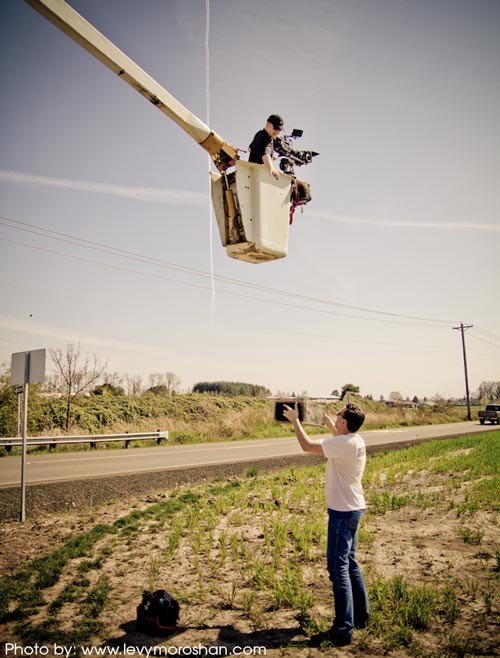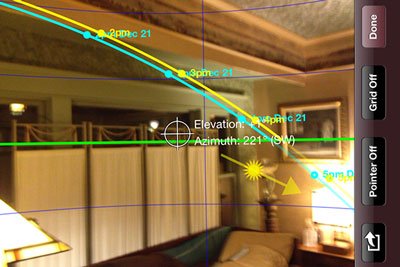The Power Of X
A simple yet powerful lighting technique anyone can master in under a minute.
Yes! Send Me My Free Video

You will meet many people—cast and crew—who broke into the film industry through a wide variety of doors. Some stumbled into it accidentally, others established their careers after some serious hard work. As I reflect on how I got my start, along with how many others I know got their starts, most routes can be boiled down to two simple principles:
My journey started in Jr. High school when I picked up my first VHS and ran around making short films with friends. This is when I realized I not only had a passion for the visual arts, but also some talent. In high school I convinced my teachers to let me create video projects instead of papers, which gave me practice on broader topics, along with deadlines and accountability. By the time I reached college, friends and family started paying me to create videos for them.
While these little paying projects were helpful when it came to paying for my gear, it certainly wasn’t the direction I wanted to head. I longed to actually work in the film industry. I needed to find a way to break into the industry.
I had no clue how to get my start. I was 20 years old and didn’t have the life experience to generate ideas. So I did the obvious: I did a search for local production companies. (Back then my method was using a phone book, the equivalent to an internet search these days.) Next I spent hours putting together a finely crafted resume along with samples of my work. When I finally thought my resume couldn’t get any more perfect, I sent it out to every production company in my area. I figured it would be no time before the phone would be ringing and I would have my pick of jobs. Nope. Only silence.
Around this time I worked at a bank, my day job to pay the bills. My tasks involved handling the transactions and account maintenance of our business customers. In the course of my work I developed relationships with each customer as I met with them during our normal business dealings. One day I realized that one of my customers was a local production company! After figuring this out I made a concerted effort to get to know the owners, and casually learn about the inner workings of film production. Through these conversations I found my way to get my start in the industry: the production company had an internship program. I asked if I could participate and they said yes. I didn’t have to give them my resume. I didn’t have to show them samples of my work. I got the internship solely because of the relationship I had already built. This leads to my first principle.
This principle continues to hold true in my career today, and actually is great advice all around. Each new opportunity has come from relationships I have cultivated over the years. The more people that I build connections with, the more opportunities I have and the more work I’m offered. It is important to point out that these aren’t from me stuffing business cards down people’s throats, or spamming inboxes. These are genuine interactions. If you want real work, you need to be real.
With the proliferation of the social media, it is even easier these days to connect with people in the industry. Or harder. There are more people out there trying to network just as hard, so it’s possibly your attempts might get diluted out. This is where being real and genuine come in. Create low-commitment conversations with various people in the industry, and grow the relationship from there. Don’t dismiss anyone, since today’s production assistant might be tomorrow’s executive producer.
Don’t limit your networking to only the internet, though. Find ways to network face-to-face. In my area (Portland, Oregon) there are industry events put on by a local production association called the Oregon Media Production Association (OMPA). There are also local user groups and a film office for our state. These are all great ways to find local networking opportunities, and most likely there will be similar networking opportunities in your area.
Online user forums are also a great way to find people in your area to expand your film network. You’ll hear about projects that are ramping up, opportunities to advance your skills, and figure out who the real movers and shakers are. Use whatever tools you have available to you to build these relationships.

Stuck in a bucket, trying to get down …
One drawback that many experience—including me—is having knowledge from a film education yet very little real-life experience to back it up. As I began my career as an office production assistant where I created and filed documents for production, no one cared about my film education. I felt like I had so much to offer, yet no one cared. The only thing that mattered to them was my job performance. Could I be given a simple task and successfully complete it on time? Each time I showed that I could accomplish whatever task they gave me, I was given more responsibilities and more opportunities to be on set. Slowly I worked my way up. As I moved up, people would become more interested in what I had to contribute to the production.
This process might feel slow at times (and other times REALLY overwhelming when in times of desperation they give you a really HUGE task). However, looking back it does make sense. You wouldn’t give an unproven newbie responsibilities that could make or break the production. Instead you would gradually test out their skills, knowledge, work ethic, and reliability. Approach all tasks given you from this light, and don’t feel like the job is beneath you.
(Check out: An Untraditional Approach To Getting Your Start In The Film Industry )
The best piece of advice I can give you about moving up in the film industry is to know your place/role, and to work hard to deliver the best results possible. No task is too small or too mundane. The better you show you can perform at any task, the more people will take notice. The more people take notice, the more they will allow you to contribute to a production. If you keep at it and consistently deliver quality work, over time you will succeed. Guaranteed.
As you prove you are worth listening to, here are some traps to avoid:
You have a job to complete and if you don’t get it done you will hold up production, which is a costly mistake. No matter how small the task, don’t let what is happening on-set distract you from the job you have been assigned. The time to talk shop is during lunch.
A production assistant (PA) is one of the lowest positions on-set. If you are a PA and you decide to adjust marks on set, adjust the lighting, or give notes to the actors, you are operating very much outside of your role. This can have disastrous consequences to the safety of the cast and crew, as well as your career. There could be thousand of reasons why something is set the way it is. If you have a concern, go through proper channels. Speak with your immediate superior. They will know if it should be addressed and who should be addressing it. If it’s a real issue, you could be seen as a hero. If it is not, and you handle it improperly, you could be shown the door (i.e. FIRED!). So best to go through the proper channels.
When you get the call sheet, study it. Know names and understand positions. When you arrive on set, figure out who everyone is. Talking to someone you shouldn’t talk to can be the quickest way to be fired. I have seen PAs make off-handed remarks to the client, leading to the client becoming concerned about an issue that really is a non-issue. This, of course, held up production (not a good thing). If you are ever in doubt, only talk about the areas you have responsibility for, and do not offer advice or input outside of those boundaries.
When starting out, you might be very exciting to be working on a number of projects. You may even have some projects of your own lined up. But no matter how excited you are about them, keep it to yourself. If you are always talking about how great your other projects are, you will be perceived as not being present or committed to the tasks at hand. You are there to complete a job for that production, not to pitch people on your other projects, or to tell them how great you are at X, Y, or Z. Prove your value through your work, not your talk.
What you know matters. It is the what, along with your performance that will keep work coming in. If you don’t know anything, and you can’t perform, people will quickly figure this out and stop calling. However, when it comes to breaking into the industry, the what is not nearly as important. It starts with who you know, and then moves to proving yourself through your work. Focus your time and energy on these two things and you will have an easier time breaking into the industry, and growing your career.
Until Next Time – Get Out There And Shoot!
Ryan E. Walters, Cinematographer
 https://indiecinemaacademy.com/wp-content/uploads/2015/06/LC126_LightingShortFilm-Thumbnail-Web.jpg
450
800
Ryan E. Walters
https://indiecinemaacademy.com/wp-content/uploads/2013/12/Indie_cinema_Logo_2color-MF-300x116-web.png
Ryan E. Walters2015-06-15 12:00:042016-10-10 07:59:55How To Light A Narrative (Cinematic Lighting Lesson 26)
https://indiecinemaacademy.com/wp-content/uploads/2015/06/LC126_LightingShortFilm-Thumbnail-Web.jpg
450
800
Ryan E. Walters
https://indiecinemaacademy.com/wp-content/uploads/2013/12/Indie_cinema_Logo_2color-MF-300x116-web.png
Ryan E. Walters2015-06-15 12:00:042016-10-10 07:59:55How To Light A Narrative (Cinematic Lighting Lesson 26) https://indiecinemaacademy.com/wp-content/uploads/2015/02/TT002_LightingFaces-Thumbnail-Web.jpg
450
800
Ryan E. Walters
https://indiecinemaacademy.com/wp-content/uploads/2013/12/Indie_cinema_Logo_2color-MF-300x116-web.png
Ryan E. Walters2015-02-23 01:00:322015-10-31 12:07:59The Secrets To Lighting Faces (Tricks Of The Trade #1)
https://indiecinemaacademy.com/wp-content/uploads/2015/02/TT002_LightingFaces-Thumbnail-Web.jpg
450
800
Ryan E. Walters
https://indiecinemaacademy.com/wp-content/uploads/2013/12/Indie_cinema_Logo_2color-MF-300x116-web.png
Ryan E. Walters2015-02-23 01:00:322015-10-31 12:07:59The Secrets To Lighting Faces (Tricks Of The Trade #1) https://indiecinemaacademy.com/wp-content/uploads/2014/09/CC110_ContColorBal-Blank-W.jpg
450
800
Ryan E. Walters
https://indiecinemaacademy.com/wp-content/uploads/2013/12/Indie_cinema_Logo_2color-MF-300x116-web.png
Ryan E. Walters2014-09-30 17:29:192015-10-28 20:41:57Guide To Contrast & Color Correction Filters
https://indiecinemaacademy.com/wp-content/uploads/2014/09/CC110_ContColorBal-Blank-W.jpg
450
800
Ryan E. Walters
https://indiecinemaacademy.com/wp-content/uploads/2013/12/Indie_cinema_Logo_2color-MF-300x116-web.png
Ryan E. Walters2014-09-30 17:29:192015-10-28 20:41:57Guide To Contrast & Color Correction Filters https://indiecinemaacademy.com/wp-content/uploads/2015/01/30003_Lighting_8LightingTools-W.jpg
450
800
Ryan E. Walters
https://indiecinemaacademy.com/wp-content/uploads/2013/12/Indie_cinema_Logo_2color-MF-300x116-web.png
Ryan E. Walters2014-06-24 14:01:442018-01-25 10:46:178 Lighting Tools For Under $10 That Deliver Great Results [VIDEO]
https://indiecinemaacademy.com/wp-content/uploads/2015/01/30003_Lighting_8LightingTools-W.jpg
450
800
Ryan E. Walters
https://indiecinemaacademy.com/wp-content/uploads/2013/12/Indie_cinema_Logo_2color-MF-300x116-web.png
Ryan E. Walters2014-06-24 14:01:442018-01-25 10:46:178 Lighting Tools For Under $10 That Deliver Great Results [VIDEO] https://indiecinemaacademy.com/wp-content/uploads/2014/03/IndieCinemaAcademy-Generic.gif
281
600
Ryan E. Walters
https://indiecinemaacademy.com/wp-content/uploads/2013/12/Indie_cinema_Logo_2color-MF-300x116-web.png
Ryan E. Walters2014-03-31 17:28:382018-01-25 10:45:51Untraditional Use Of Video: Motion Photography
https://indiecinemaacademy.com/wp-content/uploads/2014/03/IndieCinemaAcademy-Generic.gif
281
600
Ryan E. Walters
https://indiecinemaacademy.com/wp-content/uploads/2013/12/Indie_cinema_Logo_2color-MF-300x116-web.png
Ryan E. Walters2014-03-31 17:28:382018-01-25 10:45:51Untraditional Use Of Video: Motion Photography https://indiecinemaacademy.com/wp-content/uploads/2013/08/savethecat3.jpg
225
400
Tim
https://indiecinemaacademy.com/wp-content/uploads/2013/12/Indie_cinema_Logo_2color-MF-300x116-web.png
Tim2013-08-14 16:53:142018-01-22 14:38:55“Save The Cat!” Screenwriting Book: Chapter Three Summary
https://indiecinemaacademy.com/wp-content/uploads/2013/08/savethecat3.jpg
225
400
Tim
https://indiecinemaacademy.com/wp-content/uploads/2013/12/Indie_cinema_Logo_2color-MF-300x116-web.png
Tim2013-08-14 16:53:142018-01-22 14:38:55“Save The Cat!” Screenwriting Book: Chapter Three Summary https://indiecinemaacademy.com/wp-content/uploads/2013/07/savethecat2.jpg
225
400
Tim
https://indiecinemaacademy.com/wp-content/uploads/2013/12/Indie_cinema_Logo_2color-MF-300x116-web.png
Tim2013-07-24 09:26:422018-01-22 14:38:37“Save The Cat!” Screenwriting Book: Chapter Two Summary
https://indiecinemaacademy.com/wp-content/uploads/2013/07/savethecat2.jpg
225
400
Tim
https://indiecinemaacademy.com/wp-content/uploads/2013/12/Indie_cinema_Logo_2color-MF-300x116-web.png
Tim2013-07-24 09:26:422018-01-22 14:38:37“Save The Cat!” Screenwriting Book: Chapter Two Summary https://indiecinemaacademy.com/wp-content/uploads/2013/07/savethecat1.jpg
225
400
Tim
https://indiecinemaacademy.com/wp-content/uploads/2013/12/Indie_cinema_Logo_2color-MF-300x116-web.png
Tim2013-07-05 16:42:552019-01-26 15:30:06“Save The Cat!” Screenwriting Book: Chapter One Summary
https://indiecinemaacademy.com/wp-content/uploads/2013/07/savethecat1.jpg
225
400
Tim
https://indiecinemaacademy.com/wp-content/uploads/2013/12/Indie_cinema_Logo_2color-MF-300x116-web.png
Tim2013-07-05 16:42:552019-01-26 15:30:06“Save The Cat!” Screenwriting Book: Chapter One Summary https://indiecinemaacademy.com/wp-content/uploads/2013/12/03-LocationScout.jpg
267
400
Ryan E. Walters
https://indiecinemaacademy.com/wp-content/uploads/2013/12/Indie_cinema_Logo_2color-MF-300x116-web.png
Ryan E. Walters2013-05-22 09:00:082015-07-05 14:11:50Part 03: How To Location Scout
https://indiecinemaacademy.com/wp-content/uploads/2013/12/03-LocationScout.jpg
267
400
Ryan E. Walters
https://indiecinemaacademy.com/wp-content/uploads/2013/12/Indie_cinema_Logo_2color-MF-300x116-web.png
Ryan E. Walters2013-05-22 09:00:082015-07-05 14:11:50Part 03: How To Location ScoutThis site uses cookies. By continuing to browse the site, you are agreeing to our use of cookies.
AcceptHide notification onlySettingsWe may request cookies to be set on your device. We use cookies to let us know when you visit our websites, how you interact with us, to enrich your user experience, and to customize your relationship with our website.
Click on the different category headings to find out more. You can also change some of your preferences. Note that blocking some types of cookies may impact your experience on our websites and the services we are able to offer.
These cookies are strictly necessary to provide you with services available through our website and to use some of its features.
Because these cookies are strictly necessary to deliver the website, refusing them will have impact how our site functions. You always can block or delete cookies by changing your browser settings and force blocking all cookies on this website. But this will always prompt you to accept/refuse cookies when revisiting our site.
We fully respect if you want to refuse cookies but to avoid asking you again and again kindly allow us to store a cookie for that. You are free to opt out any time or opt in for other cookies to get a better experience. If you refuse cookies we will remove all set cookies in our domain.
We provide you with a list of stored cookies on your computer in our domain so you can check what we stored. Due to security reasons we are not able to show or modify cookies from other domains. You can check these in your browser security settings.
We also use different external services like Google Webfonts, Google Maps, and external Video providers. Since these providers may collect personal data like your IP address we allow you to block them here. Please be aware that this might heavily reduce the functionality and appearance of our site. Changes will take effect once you reload the page.
Google Webfont Settings:
Google Map Settings:
Google reCaptcha Settings:
Vimeo and Youtube video embeds:
You can read about our cookies and privacy settings in detail on our Privacy Policy Page.
Privacy Policy
Leave a Reply
Want to join the discussion?Feel free to contribute!